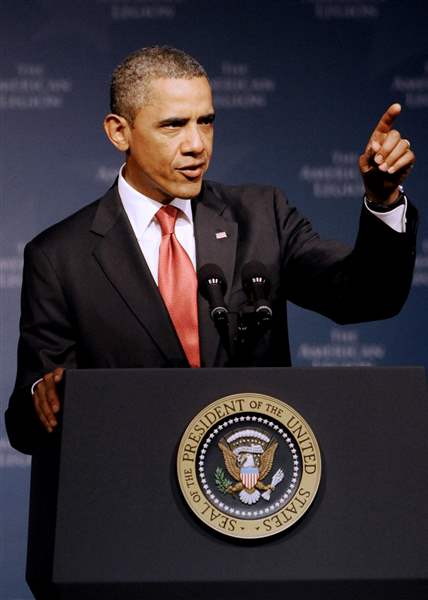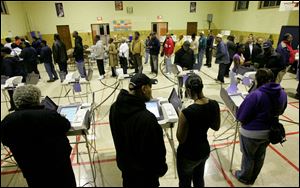
Obama campaign fighting Ohio voting law
Rules on absentee, early votes opposed
8/31/2011
President Barack Obama addresses the national convention of the American Legion. Tuesday, Aug. 30, 2011, in Minneapolis.
ASSOCIATED PRESS

People vote at the polling place inside Fulton Elementary in Toledo, Ohio, Tuesday, November 4, 2008.
COLUMBUS -- President Obama's campaign sees enough of a threat in Ohio's new law restricting early and absentee voting that it has become involved in what is otherwise an internal state fight.
If a current petition effort is successful, House Bill 194 would be placed on hold until at least after the November, 2012, presidential election.
With 30 percent of all Ohio votes in the 2008 presidential election cast before the polls opened, Mr. Obama's re-election campaign has emailed supporters to direct them to petitions.
"We're mobilizing on the ground all month to get to 231,000 signatures because nothing is more fundamental to our democracy than the right to vote," Greg Schultz, state director for the Obama campaign, wrote in one email.
"If even one eligible Ohio voter can't cast a ballot in November, 2012, because of these new rules, because the lines were too long or they couldn't get off work to make it to the polls in time, we'll be asking ourselves if we did enough to prevent it from happening," he wrote.
House Bill 194 was passed solely with Republican votes and was signed by Gov. John Kasich. Barring a successful referendum petition, the law will take effect Sept. 30 in time to affect this fall's election as well as next year's presidential election.
Among its numerous provisions, the law would:
Reduce the time period for casting absentee ballots from 35 days before the election to 21 days.
Reduce the time period for casting such ballots in person to 17 days before the election with the window closing at 6 p.m. on the Friday before the election. No in-person early voting would be allowed on Sundays.
Prohibit county boards of elections from mass-mailing applications for absentee ballots to all registered voters, a practice preferred in the past by urban counties such as Lucas.
Postpone the date of next year's primary election to May from March, a recognition that new Census-adjusted maps for congressional and state legislative districts have yet to be adopted.

President Barack Obama addresses the national convention of the American Legion. Tuesday, Aug. 30, 2011, in Minneapolis.
Eliminate the prior legal mandate that a poll worker in a multiprecinct polling place must direct an otherwise qualified voter who goes to the wrong precinct table to the right table. A provisional ballot cast in the wrong precinct won't be counted.
Republicans have argued that the changes were necessary to create a uniform system for all counties.
"The Obama re-election machine sees an opportunity to suppress the votes of suburban and rural counties where Republicans typically fare better than Democrats …" Ohio Republican Party Chairman Kevin DeWine said. "That's a big part of what's playing out in Cuyahoga County, where they're mailing out absentee ballot applications."
"We're finding that most counties in the state aren't able to do that," he said. "It seems the large urban counties where Obama ran up the numbers in 2008 are the ones clamoring to send out absentee ballots. This is clearly not an effort looking at 2011, but at 2012 to suppress the votes."
With the law's future in doubt, Secretary of State Jon Husted, a Republican last week issued his own directive prohibiting the mass mailing of absentee ballot applications by boards of election.
That resulted in a showdown with Cuyahoga County, where its new executive, Ed FitzGerald, a Democrat, opted to pay for the mailings out of his own budget, sidestepping the directive affecting the elections board.
A study by the University of Akron's Ray C. Bliss Institute of Applied Politics of early voting in Ohio showed that early voting in the 2010 gubernatorial election favored incumbent Democratic Gov. Ted Strickland.
He received 52.8 percent of the early vote cast.
But in the end Republican John Kasich won the election, receiving 51.4 percent of the larger vote that turned out on Election Day.
In that race, 25.8 percent of the total votes were cast prior to Election Day.
"This is an issue all over the country," said John Green, the Bliss Institute's executive director. "Republican-led legislatures in many states have passed similar kinds of election-law changes. It's a national debate about what's more important, the integrity of the ballot or greater access to the ballot.
"People who want integrity are willing to sacrifice a little access to the ballot," he said. " … People who are really interested in access are willing to sacrifice a little integrity. … It depends on where one's values are located."
Contact Jim Provance at: jprovance@theblade.com or 614-221-0496.